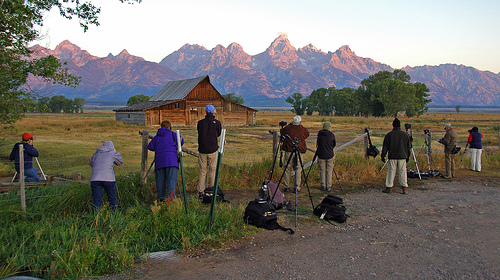Deranged Writers
 A few weeks ago I read The Tunnel by Ernesto Sabato, a novella of the “this is why I am so crazy” genre of first-person fiction. After reading it I decided that when it’s done well these kinds of narratives can be really compelling and I started to wonder what other kinds of stories like this are out there.
A few weeks ago I read The Tunnel by Ernesto Sabato, a novella of the “this is why I am so crazy” genre of first-person fiction. After reading it I decided that when it’s done well these kinds of narratives can be really compelling and I started to wonder what other kinds of stories like this are out there.
Then a real-life one surfaced. You might have heard about this story. A psychopathic man walks into his gym, shuts off the lights and starts shooting. Three women died, many others were critically injured including a pregnant 26-year-old aerobics instructor and her husband. Then he killed himself. Turns out the guy kept a journal and a blog and even posted confessional videos on youtube.
I’ve been going back and forth about whether or not I should even post this here. I decided that I would because as creepy and sad and strange as this edited version of his journal (pdf) is, it’s still perversely interesting. Literature it is not, but somehow it makes the case that “this is why I’m crazy” fiction is only that. Only fiction. The minds of the truly deranged, I think, do not make for good reading.
Classic Word Spaces (4): Leo Tolstoy

View of the house from the gardens.
Matthew Simmons already did a quick feature on Leo Tolstoy’s Word Space (the desk in the photo from Matthew’s post, I believe, is the desk from Tolstoy’s family estate in Yasnaya Polyana, south of Moscow), but I wanted to post about his Moscow home, in which Tolstoy and his family wintered from 1882 to 1901. According to what I’ve read on various travel sites, he purchased the home to placate his wife, who had grown tired of spending so much time out in the country.
In this house, he wrote The Death of Ivan Illych, among other of his later writings, took up bicycling, played chess, met Tchaikovsky, etc.
After the jump, I’ve posted a lot of photographs. They are not my photographs. I did not take photographs of the house when I was in the house. The photographs come from a personal blog I found through Google image searches. The travel blog belongs to someone named Bryan Persell. Thank you, thank you, Bryan, whoever you are, for posting these pics in 2007. I’m going to type about each photograph the things I remember from when we toured the house in June. The things I type up are what our guide told us, but if anyone knows more or has a correction, please share in the comments.
Emails from ‘The Littlest Literary Hoax’
 The Chronicle of Higher Education recently posted an article about a few years old DFW/Delillo-related prank authored by a Jay Murray Siskind and published in Volume 11, Issue 4 of Modernism/Modernity, a scholarly literary critical quarterly review. According to the Chronicle, Mark Sample, an assistant professor of English at George Mason University, discovered the article, a review of Oblivion, in 2005 when one of his graduate students cited it in an essay. He forgot about it, time passed, then he got curious and dug some more to discover a good bit of humor behind the whole thing. I won’t go on to summarize all of the details, as plenty of information is out there already and many other blogs have covered it – see the following links:
The Chronicle of Higher Education recently posted an article about a few years old DFW/Delillo-related prank authored by a Jay Murray Siskind and published in Volume 11, Issue 4 of Modernism/Modernity, a scholarly literary critical quarterly review. According to the Chronicle, Mark Sample, an assistant professor of English at George Mason University, discovered the article, a review of Oblivion, in 2005 when one of his graduate students cited it in an essay. He forgot about it, time passed, then he got curious and dug some more to discover a good bit of humor behind the whole thing. I won’t go on to summarize all of the details, as plenty of information is out there already and many other blogs have covered it – see the following links:
Mark Sample’s original post regarding the ‘hoax.’
The Chronicle of Higher Education article, written by Peter Monaghan.
However, I do have this to add. I’ve got the email exchange between the graduate student, who asked to remain anonymous, and Sample, who kindly gave me permission to share it with you here. It’s a great little exchange, pretty funny. Enjoy after the break.
Concerning the Spiritual in Indie Rock
 I often forget that The Believer publishes some original content online, mostly because pieces don’t appear there very often, or on any particular schedule (at least, not one that’s apparent to me). But today is a glad day, for I have been to Believermag.com and I have found there Judy Berman’s online exclusive “Concerning the Spiritual in Indie Rock.” It’s a great, smart article, and does double duty as the blueprint for a pretty kickass playlist. Berman starts with Kandinsky’s essay “Concerning the Spiritual in Art” (published in 1911, which was the year after, according to Virginia Woolf, “human character changed”) and then takes a hard jump forward to Neutral Milk Hotel’s 1998 album, In the Aeroplane Over the Sea. Onward then to Arcade Fire, Gowns, Dan Deacon, the new Animal Collective single “My Girls,” the idea of worship and praise as unfixed experiences, and the idea of drone music as a successor/re-incarnation of certain kinds of meditation. But my favorite part of the piece is about the band Ponytail (pictured above), because I saw these guys open for Mission of Burma right before I went out of the country in July, and let me tell you, everything Berman says about them is right-on.
I often forget that The Believer publishes some original content online, mostly because pieces don’t appear there very often, or on any particular schedule (at least, not one that’s apparent to me). But today is a glad day, for I have been to Believermag.com and I have found there Judy Berman’s online exclusive “Concerning the Spiritual in Indie Rock.” It’s a great, smart article, and does double duty as the blueprint for a pretty kickass playlist. Berman starts with Kandinsky’s essay “Concerning the Spiritual in Art” (published in 1911, which was the year after, according to Virginia Woolf, “human character changed”) and then takes a hard jump forward to Neutral Milk Hotel’s 1998 album, In the Aeroplane Over the Sea. Onward then to Arcade Fire, Gowns, Dan Deacon, the new Animal Collective single “My Girls,” the idea of worship and praise as unfixed experiences, and the idea of drone music as a successor/re-incarnation of certain kinds of meditation. But my favorite part of the piece is about the band Ponytail (pictured above), because I saw these guys open for Mission of Burma right before I went out of the country in July, and let me tell you, everything Berman says about them is right-on.
The title of Ponytail’s most recent album, Ice Cream Spiritual (2008), perfectly captures the band’s sugar-high, wonder-stricken noise-punk. Singer Molly Siegel’s high-pitched shrieks and her bandmates’ wild, experimental take on the classic guitar-bass-drum combination recall nothing more than childhood playtime. For Siegel, childhood and spirituality are about both exploding boundaries between ourselves and the universe and the “ecstasy in losing yourself” that creates.
Be sure to check out the rest of the Believer online exclusives, which includes Stephen Elliott interviewing Matt Bai, two music pieces by Matt Derby, and Chloe Veltman’s classic “The Passion of the Morrissey.”
PS- I’ll be in Tokyo till Tuesday so I won’t be around. Don’t have too much fun without me.
If anybody is wondering why I religiously re-blog the Brights’ Jezebel posts, it’s simple: I think they’re really fun geniuses and I want them to be friends with me a lot. In this installment of their mother/daughter sex advice column, a couple looking to open their relationship up asks where to find positive role-models for conscientious and fulfilling non-monogamy.
Aretha: Well! This cracked me up because all I could think was, “My mom could tell you A LOT more about this than I can!”- lol.
Susie: Yeah, har-de-har-har.
Aretha: Thinking about what happened with you and Dad made me want to caution this girl that picking who you open your relationship with is super-duper important. Stay away from needy stalker people who want more than you can give them.
Susie: In my defense… in all the years I’ve been with your dad (21)- all non-monogamous- I can only think of two (and in retrospect, mercifully brief) times that we went through some real grief. I don’t blame it on being “open” – it’s just the hard things relationships go through at times, be they social, platonic, or battles with your own relatives.
You never knew about all the times everything worked out copacetic or drama-free, because part of our “open relationship” ethos was protecting our family life: Kids come first, privacy is a big deal, and discretion is definitely the better part of valor.
God, the sanity! The well-adjustedness! It’s breathtaking, really.
There’s a new issue of Bookslut up. As usual, it’s action-packed with features and interviews, but I’d like to draw your attention to three non-fiction reviews of books I didn’t know existed and am very pleased to have been made aware of. Interestingly, all three books are written by women, all three are reviewed by women, and all three have subtitles. Here they are: (1) Slanted and Enchanted: The Evolution of Indie Culture by Kaya Oakes, reviewed by Gina Meyers. (2) I’m Perfect, You’re Doomed: Tales from a Jehovah’s Witness Upbringing by Kyria Abrahams, reviewed by Kate Munning. (3) The Importance of Being Iceland: Travel Essays in Art by Eileen Myles, reviewed by Elizabeth Bachner.
Interview with The Cupboard




To celebrate their first year of publishing, I sent some questions to Adam Peterson and Dave Madden, the masterminds behind The Cupboard (a quarterly pamphlet of creative prose), and they were game to retort.
[interview after the jump]
Favorite First Sentences

Alright. All this Lish talk has me thinking about first sentences: the pleasure derived from them, the importance, the world-containing, etc.
My favorite first sentence is from Blood Meridian, which is weird to me because I’ve tried to read the book three times and have put it down halfway each time, but it is still a powerful book, maybe too powerful for me at the moment. Anyway, its first sentence:
See the child.
That, to me, is awesome; a plain evocation, and commandment, biblical as all hell which is what Cormac does so wonderfully.
And my other favorite opener, from The Stranger:
Maman died today.
Detached, even with the endearing colloquialism. Prescient, full of doom.
Alright, now you go.
